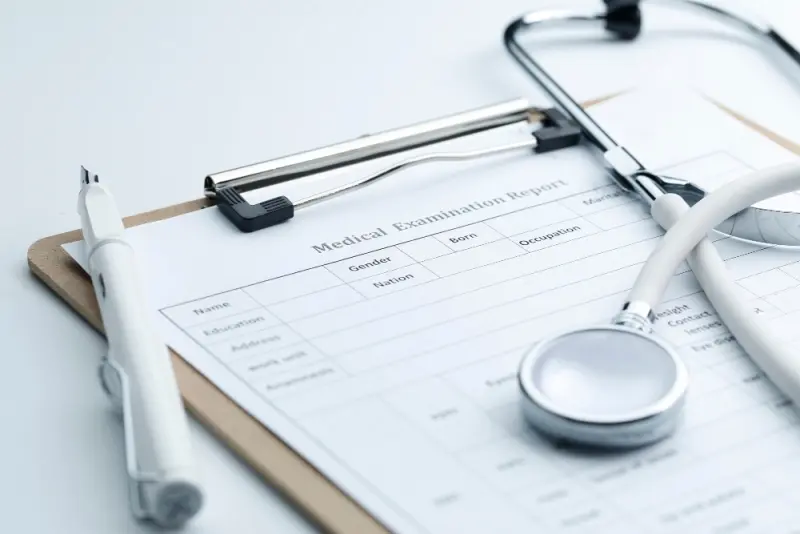-
-
Admin
- 0
Types of Medical Reports During Diagnosis-Treatment Processes and Their Translations
 In the course of healthcare services at medical institutions, various medical documents are generated concerning the patient, encompassing both the diagnosis and treatment procedures employed. Occasionally, these prepared documents may find application in another country. In such cases, precise translation becomes imperative, falling under the domain of medical translation services.
In the course of healthcare services at medical institutions, various medical documents are generated concerning the patient, encompassing both the diagnosis and treatment procedures employed. Occasionally, these prepared documents may find application in another country. In such cases, precise translation becomes imperative, falling under the domain of medical translation services.Our article will delve into the diverse categories of medical reports, exploring their intended purposes and highlighting key considerations to bear in mind during their translation process.
Report Types
Epicrisis Documents
The term "Epicrisis," rooted in ancient Greek, carries meanings such as conclusion and decision. Within the medical context, it refers to a comprehensive and analytical examination, evaluation, or summary of a patient's case history. This document encompasses all medical details pertaining to a discharged patient, encompassing their complaints, disease history, a chronological record of administered treatments, and their outcomes.
When seeking medical attention at another healthcare institution, whether for the same ailment or a different one, patients are expected to furnish an epicrisis document. Epicrises play a crucial role in providing attending doctors with essential information in advance during new diagnostic and treatment processes. This not only mitigates risks such as unnecessary tests, inappropriate treatments, and potentially harmful prescriptions but also streamlines the overall medical care.
In cases where the epicrisis is intended for a foreign medical professional, adhering to medical translation quality standards becomes crucial. Translating the epicrisis accurately ensures effective communication and understanding, fostering seamless collaboration between healthcare providers across language barriers.
Treatment and Care Plans
Treatment and care plans delineate the patient's diagnosis along with the prescribed drugs, methods, and objectives underlying the recommended treatment. They provide a comprehensive overview, specifying the treatment duration, anticipated outcomes, drug dosages, as well as dietary and exercise guidelines for the patient. While primarily tailored for medical professionals, this information also serves to educate the patient on pertinent aspects of their care.
The document should transparently communicate any potential side effects and risks associated with the prescribed treatment methods and medications. It is imperative to include clear instructions on emergency measures to be undertaken in the event of complications. Additionally, if applicable, explicit guidelines concerning patient care plans, which may be executed by a third party, should be incorporated. This ensures a holistic and comprehensible approach to the patient's well-being and ongoing care.
Test results
A myriad of medical tests are essential for diagnosing various health complaints, requiring patients to undergo procedures such as blood tests, urinalysis, biopsy, and endoscopy. These tests play a pivotal role in achieving accurate diagnoses. Test result documents present measured values in comparison with established reference values. Deviations from these reference values enable doctors to discern potential diseases and formulate appropriate treatment plans.
Translations of such medical documents are typically conducted alongside other relevant medical records to facilitate a comprehensive evaluation by foreign doctors. This holistic approach ensures that all pertinent information, including test results, is accurately conveyed, allowing for a thorough understanding of the patient's medical history and aiding in the diagnostic and treatment processes.
Why Translating Medical Reports Matters
Treatment Abroad
Healthcare systems, costs, and medical advancements exhibit significant variations worldwide. For instance, dental treatments that might cost thousands of dollars in the United States can be considerably cheaper or even free in other countries. Similarly, certain nations may offer more advanced and effective treatment methods for specific diseases that might not be readily available elsewhere. Given the high costs associated with cutting-edge medical devices and medications, economically disadvantaged regions may lack access to these resources. Consequently, patients often seek solutions abroad, aiming to receive treatment that is not only cost-effective but also potentially more efficacious.
Health Insurance Transactions
Individuals traveling abroad for reasons such as business or vacation may find themselves in need of healthcare services. In order to seek reimbursement from their insurance companies for the expenses incurred during these services, individuals are typically required to submit pertinent medical documents. Insurers conduct a thorough examination of the specified procedures and medical supplies utilized in the treatment process, subsequently making payments to the insured for those covered by the policy. To ensure the precision of translations, sworn or notarized translations of documents may also be requested in certain cases.
Health Reports for International Job Applications
Employers, particularly in specific industries that demand optimal health, often request health reports as part of the job application process. For instance, positions involving the operation of machinery or vehicles may necessitate a medical report confirming hand coordination and vision. In fields where mental stability is crucial, applicants may be required to submit a report on their psychological status. Similarly, roles that involve physical exertion may involve scrutiny of health reports detailing information about heart health. These measures are taken to ensure that candidates meet the health requirements essential for the respective job roles.
Best Practices for Translating Medical Reports
Medical content is laden with specialized terms and abbreviations that only trained medical professionals can fully comprehend. Therefore, the translation of medical reports should ideally be conducted by a medical doctor or, even more ideally, a specialist in the relevant medical field. This is essential to ensure that the physician reading the report in the target language can fully grasp all expressions and nuances.

Tek Translate meets this crucial requirement by providing impeccable epicrisis translations through its team of medical translators, all of whom are specialist physicians. This ensures a level of expertise and accuracy necessary for the precise translation of intricate medical terminology and content.
Medical documents are frequently submitted to translation offices in the form of photographs or scanned PDF files. In cases where pages have low resolution, leading to illegibility, issues such as misreading of numbers can arise during the translation process. To mitigate these challenges, it is essential to employ advanced optical character recognition (OCR) software. This technology enhances the accuracy of the translation process by ensuring a more precise extraction of text from images, thereby minimizing the risk of misinterpretation, especially in critical fields like medical translation.
Confidentiality is a paramount consideration when translating medical reports. Patient's private health information is sensitive content that should never be disclosed to third parties without their explicit consent. Rigorous confidentiality measures must be implemented throughout the transmission, processing, and storage of medical documents. Translated materials should only be stored if absolutely necessary and should be promptly deleted from all media after delivery to the patient.
Tek Translate recognizes the critical nature of confidentiality in medical content and collaborates with specialist physicians who are well-versed in these requirements. We uphold stringent precautions within the framework of our translation quality management process to safeguard the privacy and security of medical information. If you wish to learn more about our approach to privacy, you can refer to our Privacy Policy for comprehensive information on this matter.
Write a comment
-
- Translation Hotline: +44 0755 319 5602
- WhatsApp: +90 541 473 0337
-
- Customer LoginTranslator Login
About Medical Reports and Translations
2024 © tektranslate.com - TEK ÇEVİRİ TERCÜME DANIŞMANLIK VE BİLİŞİM HİZMETLERİ TİC. LTD. ŞTİ.
Comments
There are no comments yet on this blog post. You can be the first to comment using the form below.